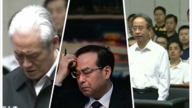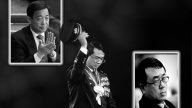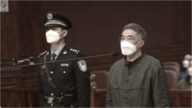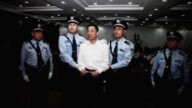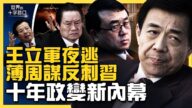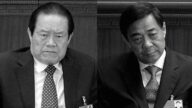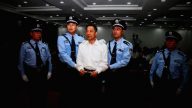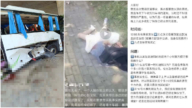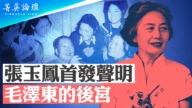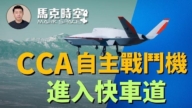【新唐人2012年2月22日讯】“王立军事件”让重庆市委书记薄熙来的贪腐败事被大量曝光,陷入四面楚歌的他正在使出浑身解数摆脱危机。而在此时,中央纪委书记贺国强的反腐工作报告,在延迟一个月之后,突然高调登场,引发外界诸多揣测。
2月19号,中共《新华网》全文刊发了贺国强在中共十七届中央纪律检查委员会第七次全体会议上的工作报告。
贺国强在报告说,中共党员领导干部违纪违法问题依然严重﹔一些腐败案件涉案金额巨大、社会影响恶劣,窝案、串案、案中案明显增多﹔违纪违法行为日趋复杂化﹔一些党员领导干部作风方面问题比较突出等等。
贺国强承认,反腐不力可能亡党亡国。
“中南大学城市轨道交通研究所”教授王成立向《新唐人》表示,贺国强所说的都是没有用的套话。
“中南大学城市轨道交通研究所”教授王成立:“那就是作秀,那就是作秀,没有用的。没有民主体制,它这个不同的观点,它都不允许报导。它军队、警察都控制住了。”
贺国强的工作报告提交于今年1月8号,而《新华网》正式发表于2月19号,足足延迟了一个多月。目前,因为“王立军事件”,薄熙来的大量丑闻败事被一一揭露。
《北京之春》杂志主编胡平认为,北京当局是想通过“王立军事件”,把薄熙来的问题查清楚。
《北京之春》杂志主编 胡平:“从现在的情况看来,中南海对如何处理薄熙来意见是不一的,有些人想保他,有的人想从轻发落,有些人就想从严追究。在这种情况下,贺国强大概是应该属于比较主张严加追究的那一派人。”
薄熙来与王立军在重庆的所谓“打黑”风暴中,成立了270个专案组,抓捕了包括亿万富翁黎强在内的近600个所谓“黑社会”,其中许多是民营企业老板,没收他们的资产上千亿,制造了数百起冤案。
中国“政法大学”教授何兵曾估算,薄熙来“唱红打黑”花了2700亿。原香港《文汇报》驻东北办事处主任姜维平指出,薄熙来用“打黑”抢来的钱,填补2700亿的漏洞,但《华龙网》透露重庆市财政亏空仍有1000亿。
“哥伦比亚大学”政治学博士王军涛认为,中纪委并不是查腐败的机构,而是保护腐败的机构。
“哥伦比亚大学”政治学博士王军涛:“这个时候提反腐败,贺国强提反腐败,恐怕是对着王立军、薄熙来去的,但这是一方面。查不查,查谁,查多少,公布多少,处理到什么程度,它最大的一个还是要服务于维持共产党的形象和共产党统治的需要,那么从这个政治需要出发,是不可能真正去查治腐败的。”
王军涛表示,中共利用反腐败打击政敌,也不是新鲜事,前北京市委书记陈希同、前上海市委书记陈良宇就是以反腐败为名而被政敌打下马的。
王军涛:“你共产党真的要反腐败,要进行制度改革,你要把你的权力交给人民,由人民去反腐败。反腐败不能靠一句引导,共产党引导的反腐败从来越反越腐。”
“香港科技大学”社会学教授丁学良指出,中共认识到“反腐不力可能亡党亡国”的严重性,但并不等于能采取有效的治理方法。
新唐人记者周玉林、秦雪、王明宇采访报导。
Bo Xilai Engulfed in Crisis, He Guoqiang Sings an Anti-corruption Tune
The “Wang Lijun incident” exposed a large amount of corruption
cases in which Chongqing party secretary Bo Xilai was involved,
forcing Bo to seek all possible ways to escape crisis.
At the same time, secretary of Central Commission for
Discipline Inspection He Guoqiang, suddenly announced his anti-corruption report, triggering a speculation
On Feb 19, the Chinese regime’s Xinhua Network published
the full text of a report prepared by He Guoqiang
at the seventh plenary meeting of the Central Commission for
Discipline Inspection.
He Quoqiang wrote in the report, “violation of laws and
regulations by Chinese Communist Party (CCP) cadres and leadership is a serious problem.
Some such cases involve huge sums of money, causing a
very bad influence on society.
Many cases are related to or hidden inside other cases.
Discipline violations are becoming more and more complex,
and some party leaders have serious work ethic issues.”
He Quoqing admitted that the weak anti-corruption effort
could lead to the end of Chinese Communist Party (CCP).
Wang Chengli, Professor at Central South University Institute
of Urban Mass Transit, told NTD that what He Guoqing said is meaningless jargon.
Wang Chengli, “That’s acting, acting useless.
Without a democratic system, it (CCP) won’t allow reporting
on any opposing views, it controls the military and the police.”
He Guoqiang’s report was submitted on Jan. 8, but Xinhua
didn’t officially publish it until Feb. 19, a one-month delay.
Since the “Wang Lijun incident, wide exposure of Bo Xilai’s
Beijing Spring chief editor Hu Ping believes Beijing is
conducting a thorough investigation of Bo Xilai due to the “Wang Lijun incident.”
Hu Ping, “Looking at the situation now, there are conflicting
views in Zhongnanhai about how to deal with Bo Xilai.
Some people are trying to protect him, some want a lesser
punishment for him, and some want a thorough investigation.
Under this circumstance, He Guoqiang seem to be one of
those supporting a thorough investigation.”
During the “fight black” storm spearheaded by Bo Xilai and
Wang Lijun in Chongqing, 270 task teams were formed.
Nearly 600 “black society” members, including billionaire
Weng Lijiang and many private company owners were arrested.
Bo and Wang confiscated hundreds of billions of dollars in
assets and fabricated hundreds of false charges.
Professor He Bing at China’s University of political science
Estimated that Bo Xilai’s “Sing red, fight black” campaign cost 270 billion yuan.
Former Hong Kong Wen Wei Po northeast China director,
Jiang Weiping, stated that
Bo Xilai filled the 270 billion gap with money he robbed during
the “fight black” campaign,
but Hualong network brought to light the fact that there’s
still a 100 billion deficit in the Chongqing city account.
Political Science PhD at New York’s Columbia University,
Wang Juntao, believes that
the Central Commission for Discipline Inspection does not
expose corrupt institutions, rather protects them.
Wang Juntao, “Now, anti-corruption is being stressed, He
Guoqiang raised the topic of anti-corruption, and I think it’s targeting Wang Lijun, Bo Xilai… in this direction.
Whether there’s an investigation or not, an investigation into
the extent of the corruption,
and whether this is publicly revealed, its priority is still to
maintain the image of the CCP and maintain CCP’s ruling needs.
From this political starting point,
it can’t seriously investigate corruption.”
Wang Juntao expressed, the CCP using anti-corruption to
target the enemy is nothing new.
The former Beijing party secretary Chen Xitong and the
former Shanghai party secretary Chen Liangyu were both taken out with corruption charges.
Wang Juntao, “Since the CCP really wants anti-corruption
reform, give some power to the people, let the people implement anti-corruption.
Anti-corruption reform can’t be under the CCP’s guidance,
CCP guided anti-corruption only creates more corruption.”
Ding Xueliang, a Hong Kong University of Science and
Technology Professor of Sociology, believes that
the CCP realizes the serious weakness and ineffectiveness
of there anti-corruption campaign, but they don’t mean to implement effective governance.
NTD Reporters Zhou Yulin, Qin Xue and Wang Mingyu


